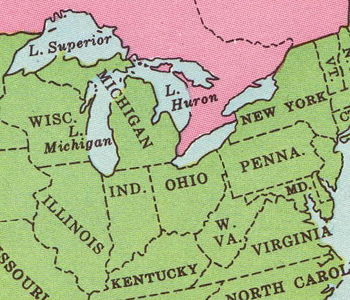Michigan (U.S. state): Difference between revisions
Pat Palmer (talk | contribs) m (Text replacement - "Indiana (U.S. state)" to "Indiana") |
Pat Palmer (talk | contribs) |
||
| Line 3: | Line 3: | ||
'''Michigan''' is one of the states constituting the [[United States of America]]. It was admitted to the Union on January 26, 1837 as the 26th state. Its dry land area is 58,527 square miles (151,586 square kilometers), the inclusion of Great Lakes waters over which it has jurisdiction raises the figure to 97,102 square miles (251,495 square kilometers). Its estimated population is 10,003,422 (2008). | '''Michigan''' is one of the states constituting the [[United States of America]]. It was admitted to the Union on January 26, 1837 as the 26th state. Its dry land area is 58,527 square miles (151,586 square kilometers), the inclusion of Great Lakes waters over which it has jurisdiction raises the figure to 97,102 square miles (251,495 square kilometers). Its estimated population is 10,003,422 (2008). | ||
Michigan is split into two large land segments: the Upper Peninsula eastward from northern [[Wisconsin]] between [[Lake Superior]] and [[Lake Michigan]], and the Lower Peninsula reaching northward from [[Indiana (U.S. state)|Indiana]] and [[Ohio]]. The two landmasses have been connected since 1957 by the five-mile (eight-kilometer) [[Mackinac Bridge]] across the [[Straits of Mackinac]], which separate [[Lake Michigan]] on the west from [[Lake Huron]] on the east. Between Lake Huron and Lake Erie, in the southeast, the Lower Peninsula is separated from the Canadian province of [[Ontario]] by [[Lake St. Clair]] and the [[St. Clair river]] and [[Detroit river]]. | Michigan is split into two large land segments: the Upper Peninsula eastward from northern [[Wisconsin]] between [[Lake Superior]] and [[Lake Michigan]], and the Lower Peninsula reaching northward from [[Indiana (U.S. state)|Indiana]] and [[Ohio (U.S. state)|Ohio]]. The two landmasses have been connected since 1957 by the five-mile (eight-kilometer) [[Mackinac Bridge]] across the [[Straits of Mackinac]], which separate [[Lake Michigan]] on the west from [[Lake Huron]] on the east. Between Lake Huron and Lake Erie, in the southeast, the Lower Peninsula is separated from the Canadian province of [[Ontario]] by [[Lake St. Clair]] and the [[St. Clair river]] and [[Detroit river]]. | ||
The capital of Michigan is [[Lansing]]. | The capital of Michigan is [[Lansing]]. | ||
Revision as of 09:33, 28 June 2023
Michigan is one of the states constituting the United States of America. It was admitted to the Union on January 26, 1837 as the 26th state. Its dry land area is 58,527 square miles (151,586 square kilometers), the inclusion of Great Lakes waters over which it has jurisdiction raises the figure to 97,102 square miles (251,495 square kilometers). Its estimated population is 10,003,422 (2008).
Michigan is split into two large land segments: the Upper Peninsula eastward from northern Wisconsin between Lake Superior and Lake Michigan, and the Lower Peninsula reaching northward from Indiana and Ohio. The two landmasses have been connected since 1957 by the five-mile (eight-kilometer) Mackinac Bridge across the Straits of Mackinac, which separate Lake Michigan on the west from Lake Huron on the east. Between Lake Huron and Lake Erie, in the southeast, the Lower Peninsula is separated from the Canadian province of Ontario by Lake St. Clair and the St. Clair river and Detroit river.
The capital of Michigan is Lansing.
The University of Michigan originated as a preparatory school in Detroit in 1817 and moved to Ann Arbor in 1837. Branch campuses were opened in 1956 (Flint) and 1959 (Dearborn).
